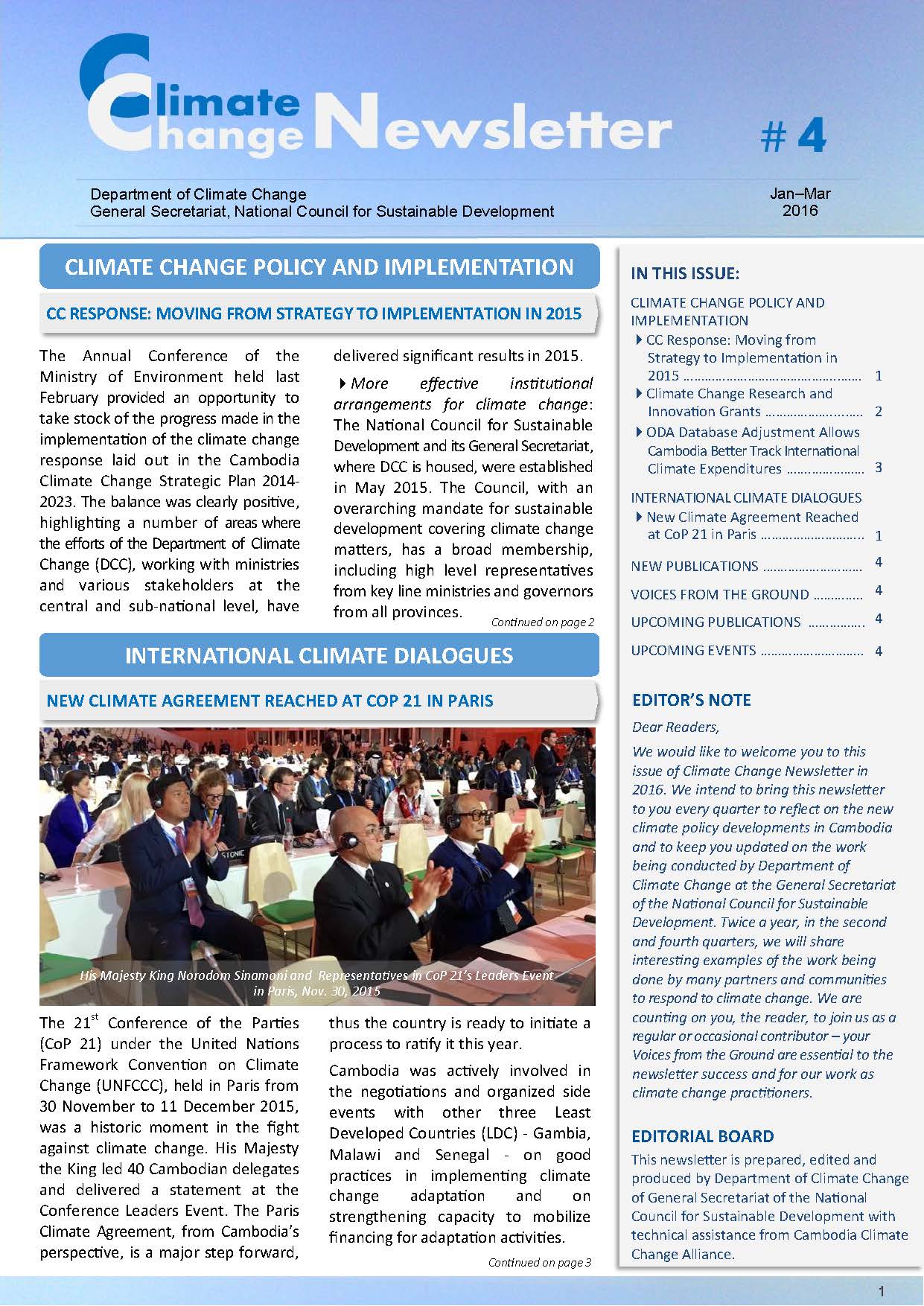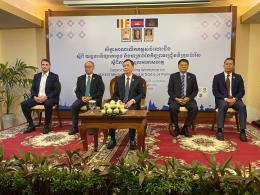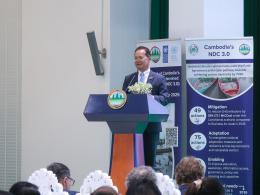 CLIMATE CHANGE POLICY AND IMPLEMENTATION
CLIMATE CHANGE POLICY AND IMPLEMENTATION
CC Response: Moving from Strategy to Implementation in 2015
The Annual Conference of the Ministry of Environment held last February provided an opportunity to take stock of the progress made in the implementation of the climate change response laid out in the Cambodia Climate Change Strategic Plan 2014-2023. The balance was clearly positive, highlighting a number of areas where the efforts of the Department of ClimateChange (DCC), working with ministriesand various stakeholders at the central and sub-national level, have delivered significant results in 2015.
- More effective institutional arrangements for climate change: The National Council for Sustainable Development and its General Secretariat, where DCC is housed, were established in May 2015. The Council, with an overarching mandate for sustainable development covering climate change matters, has a broad membership, including high level representatives from key line ministries and governors from all provinces.
- Sectors better prepared to respond to climate change: In 2015, the number of sectoral ministries and agencies with approved Climate Change Action Plans (CCAPs) has risen from 8 to 14. These CCAPs are helping sectors to guide implementation of concrete priority adaptation and mitigation measures on the ground, and they are also instrumental in mobilizing funding to scale up implementation of climate change response.
- Capacity building and awareness raising for mainstreaming climate change at sub-national level: A growing number of local authorities and communities are getting involved in climate action to build their resilience. In 2015, DCC worked with Provincial Departments of Environment in Kampong Cham, Kampot and Pursat, with the support of Cambodia Climate Change Alliance, to mainstream climate change into 9 Commune Investment Plans.
- Better prepared to mobilize much needed climate finance: The Climate Change Financing Framework, approved in 2015, identifies current sources of climate financing available and trends over the next 5-10 years and provides the first estimates of climate change impact on the economy and how climate smart investments can help reduce this impact.
- Building systems that enable a coordinated and more effective response: With the National Climate Change Monitoring & Evaluation Framework finalized in 2015 and with baselines established for 7 of its 8 core indicators, the country is ready to roll out its climate change M&E framework. This will provide crucial information to support policy and investment decisions and improve effectiveness in responding to climate change.
INTERNATIONAL CLIMATE DIALOGUES
NEW climate agreement REACHED AT COP 21 IN PARIS
The 21st Conference of the Parties (CoP 21) under the United Nations Framework Convention on Climate Change (UNFCCC), held in Paris from 30 November to 11 December 2015, was a historic moment in the fight against climate change. His Majesty the King led 40 Cambodian delegates and delivered a statement at the Conference Leaders Event. The Paris Climate Agreement, from Cambodia’s perspective, is a major step forward, thus the country is ready to initiate a process to ratify it this year.
Cambodia was actively involved in the negotiations and organized side events with other three Least Developed Countries (LDC) - Gambia, Malawi and Senegal - on good practices in implementing climate change adaptation and on strengthening capacity to mobilize financing for adaptation activities.
Key outcomes from the CoP 21 concluded a successful historic agreement for all nations around the world:
- Pursue efforts to limit temperature increase to 1.5 oC, ensuring that the global temperature increase stays "well below" 2oC (compared to the pre-Industrial Revolution era);
- Peak greenhouse gas emissions as soon as possible and achieve a balance between sources and sinks of greenhouse gases in the second half of this century;
- Review progress through updating country’s Intended Nationally Determined Contributions (INDC) every five years, monitoring GHG emission reduction efforts;
- Countries will continue to make every effort to mobilize $100 billion per year by 2025 to support climate action in developing countries;
- Provide greater financial for adaptation and technology transfer to developing countries, with special support dedicated to LDC and Alliance of Small Island States;
- Promote capacity development, especially in LDC, African countries, Small Island Countries in the Pacific Ocean and the Atlantic, for the implementation of the action plan for GHG emissions reduction and adaptation;
- Build the capacity of developing countries to strengthen their monitoring, reporting and verification systems.
As a Party of the UNFCCC, Cambodia submitted its INDC report (http://camclimate.org.kh/en/documents-and-media/library/category/137-national-report.html) to the secretariat ahead of CoP 21 in September 2015.
Download full newsletter:



